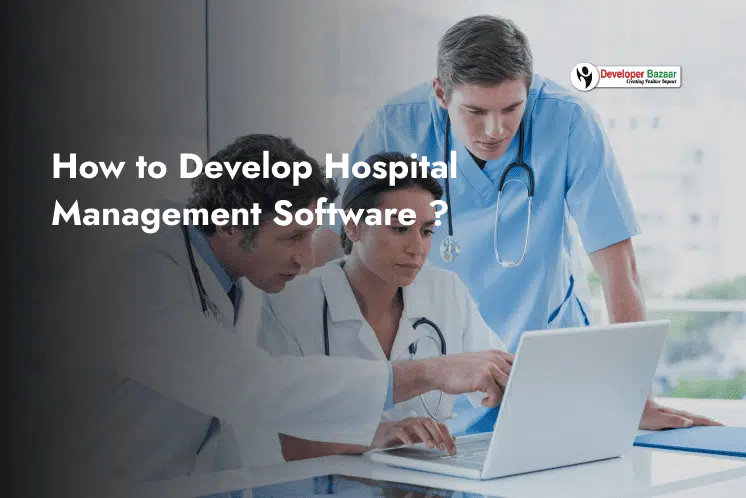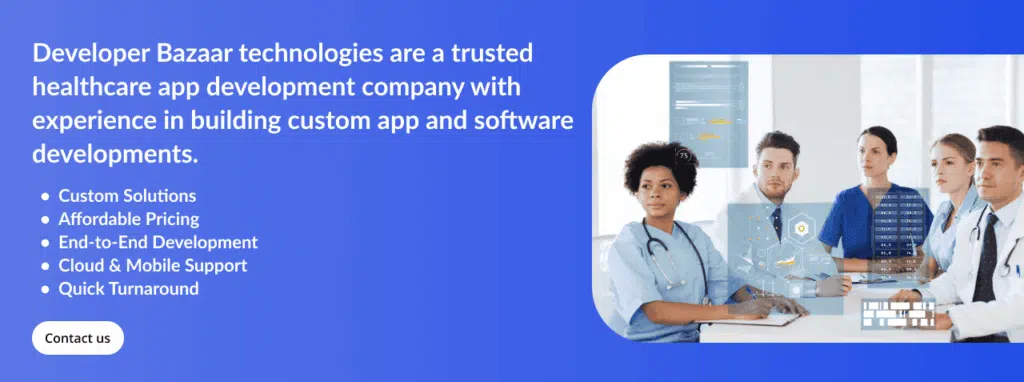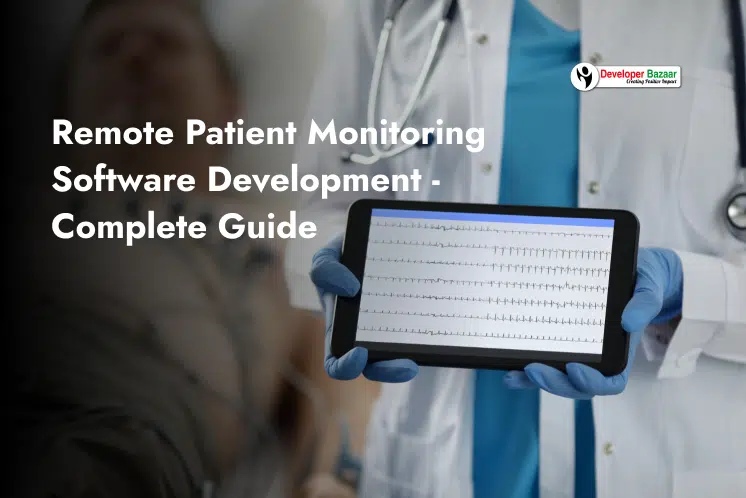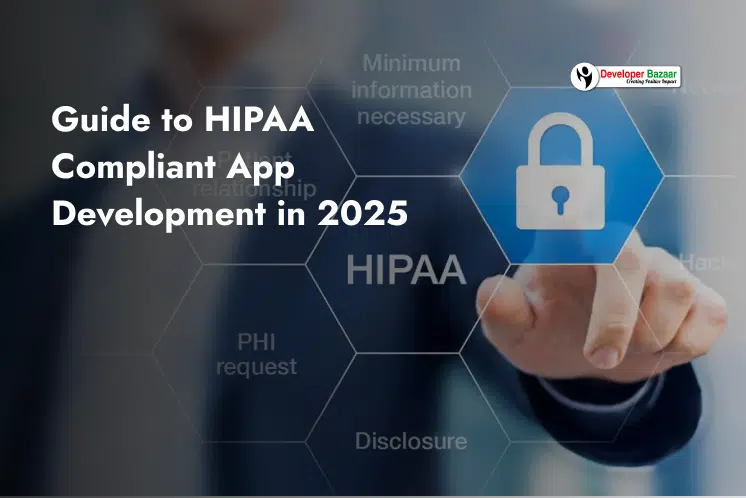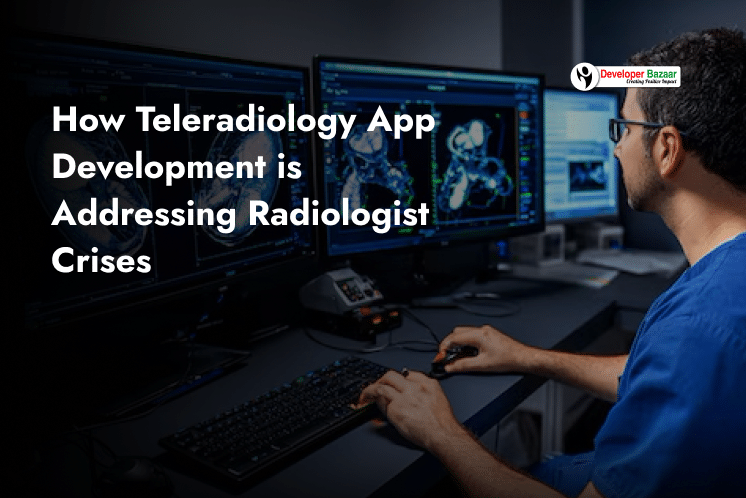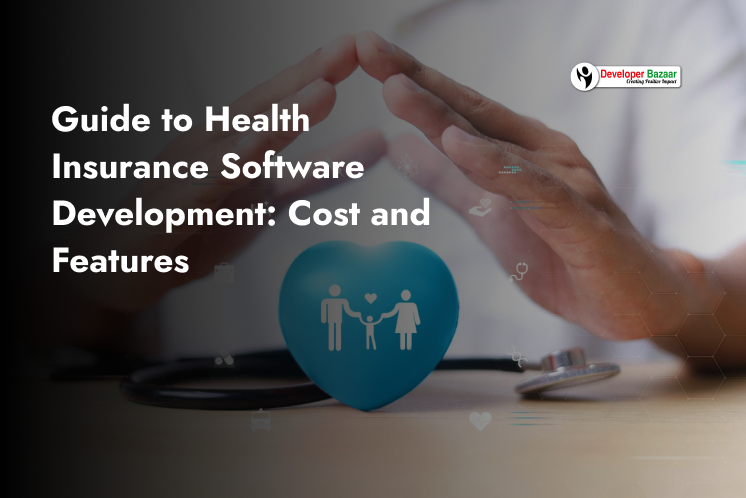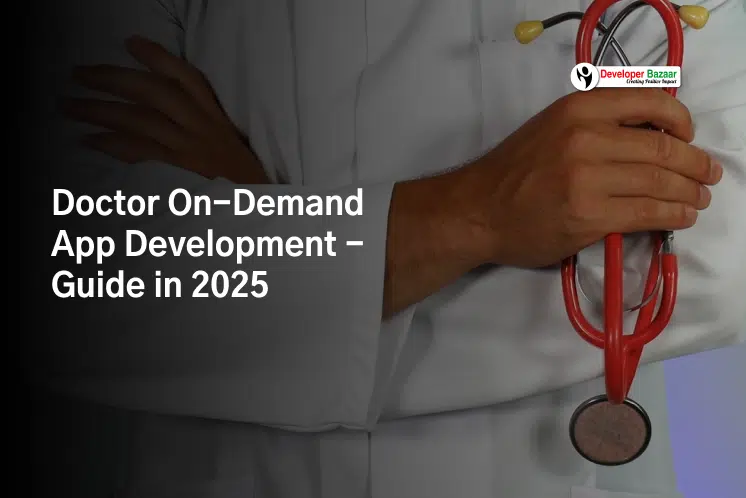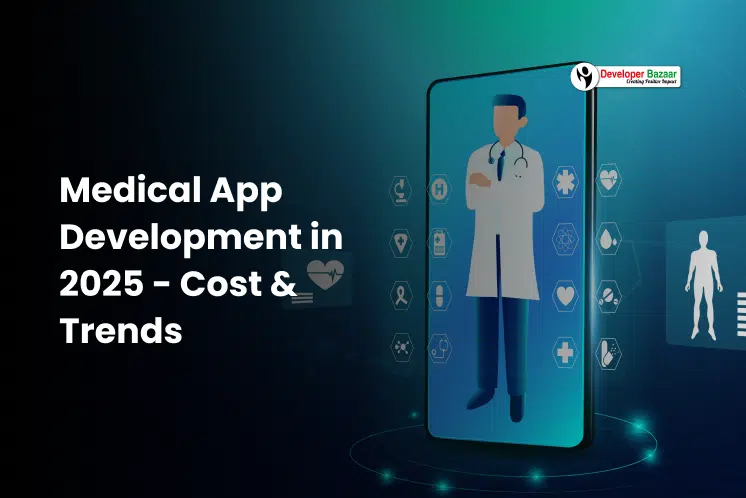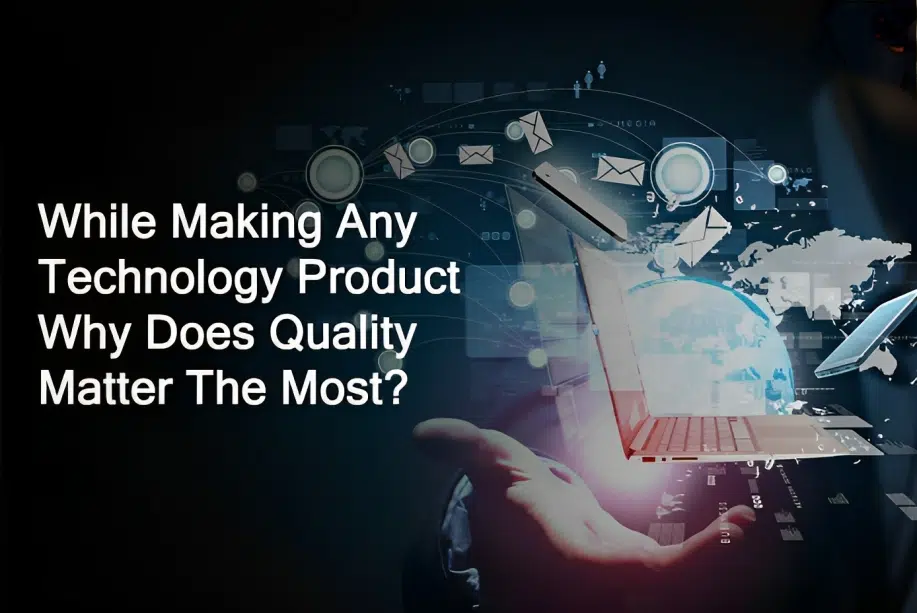Table of Contents
ToggleHospitals and clinics are always busy. Doctors, nurses, and staff work hard every day to treat many patients. But managing everything such as appointments, billing, staff schedules, and medical records can get really difficult. This is where hospital management software helps.
After the COVID-19 pandemic situation many hospitals and healthcare organizations needed a faster and a smarter way to manage everything. So, in that case some hospitals look to develop hospital management software.
In this article, you will learn what hospital management software is, how it works, the current market trends, and the main benefits of using such a system.
By the end, you’ll understand why every modern hospital needs it and how a healthcare app development company can help you build one.
What is a Hospital Management System?
A Hospital Management System (HMS) is a type of software that helps hospitals and clinics manage everything from patient appointments to billing. It stores all important data in one place and automates many tasks that doctors and staff do manually.
Here’s what it can do:
- Manage patient records and health history
- Schedule appointments
- Track doctor availability and duty rosters
- Send reminders through SMS or email
- Handle billing and insurance
- Manage inventory (like medicines and lab equipment)
When you build hospital management software, you create a system that connects doctors, nurses, receptionists, and even patients. Everyone can access the information they need, quickly and safely.
So if you are planning to develop a hospital management software, make sure it’s user-friendly and includes all essential features. That way, even small clinics can benefit from it.
Healthcare Software Market: Latest Insights
These days the healthcare software market is growing rapidly. According to Precedence Research, the global healthcare software market was worth USD 34.84 billion in 2024. It is expected to reach USD 38.50 billion in 2025 and may grow to USD 94.56 billion by 2034. That’s a 10.50% CAGR!
Another report by Grand View Research says that the healthcare IT market could grow at a rate of 15.8% from 2024 to 2030.
There are already 3,180+ companies and over 1,770 startups in this space. The industry also saw 17,000 new jobs created last year. This shows there is a high demand for such software worldwide.
Countries like the USA, India, UK, Germany, and Canada are leading the innovation. Cities like New York, London, San Francisco, Bangalore, and Pune are becoming tech hubs for healthcare app development.
So, if you are planning to enter the market or want to develop a hospital management system, this is the perfect time to start.
Just make sure you work with an experienced software development company that understands both healthcare and tech.
Key Benefits of Hospital Management System
Why do hospitals need hospital management systems?
There are some key benefits of HMS:
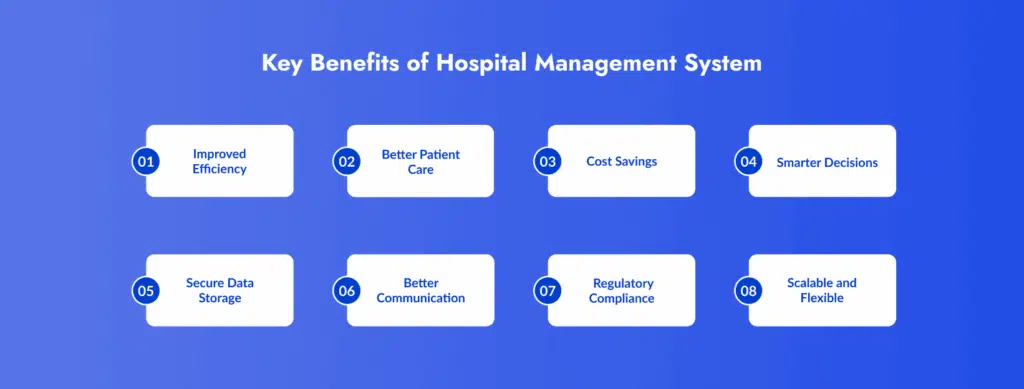
1. Improved Efficiency
A hospital management system automates daily tasks. No more writing appointments on paper or searching files manually. This saves time and reduces errors. Staff can now focus more on patient care.
For example, when you develop hospital management software, you can add features like auto-scheduling, one-click reports, and instant patient registration. This increases overall productivity.
2. Better Patient Care
Doctors can quickly check patient histories and write accurate prescriptions. Patients also get reminders for tests, follow-ups, and medicine. This makes patients feel more cared for.
Also, patient monitoring software development lets doctors track vital signs in real-time and take action quickly in emergencies.
3. Cost Savings
Running a hospital can be expensive. But when you build hospital management software, it reduces the need for manual work and paper records. It also avoids double-booking and medicine waste through inventory tracking.
4. Smarter Decisions
The system gives real-time data and reports. Want to know which doctor has the most appointments? Or which lab test is used the most? You can find out in seconds.
This helps hospital managers make smart choices for staff, budget, and resources.
5. Secure Data Storage
Medical records are private. That’s why a good hospital system includes strong data protection features like encryption, secure logins, and backups. This keeps patient info safe and meets legal rules like HIPAA.
When you work with a healthcare app development company, make sure they build these safety tools into your software.
6. Better Communication
Hospital departments often work separately. This leads to confusion. But when you build hospital management software, it connects everyone, receptionists, labs, pharmacies, doctors, and even patients.
Everyone can send and receive messages inside the system. This avoids delays and mistakes.
7. Regulatory Compliance
Health systems must follow rules related to billing, insurance, and data storage. A custom system can be designed to follow all these rules automatically, reducing the risk of fines.
A professional software development company can help you with the right features for compliance.
8. Scalable and Flexible
Hospitals grow. Staff increases. New departments are added. A good hospital system can grow with you.
Whether you’re managing 100 patients or 10,000, a custom software solution can handle it without needing to change everything. That’s why it’s smart to develop hospital management software with scalability in mind.
What are the Different Hospital Management System Modules?
Modern hospitals operate multiple tasks like managing patient records, appointments, lab reports, billing, and administrative tasks simultaneously. To handle all this efficiently, a strong hospital management system is composed of multiple interconnected modules:
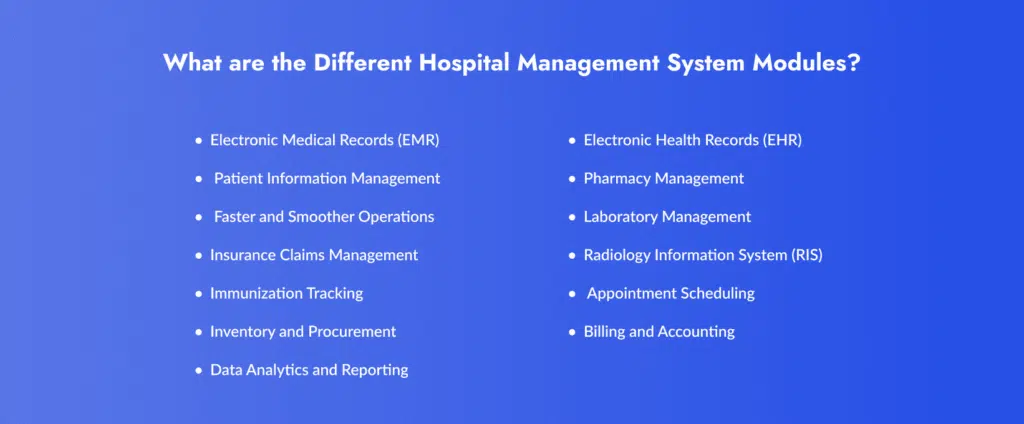
1. Electronic Medical Records (EMR)
Manages patient information like diagnoses, medications, and medical history. Often confused with EHRs, EMRs are more hospital-specific, whereas EHRs provide a broader health overview and support data sharing across institutions.
2. Patient Information Management
Tracks every step of a patient’s journey like registration, admission, discharge, billing, and follow-ups. It makes sure that healthcare providers have centralized access to vital patient data.
3. Human Resource Management
Manages staffing, shift allocations, payroll, and compliance. This module helps in maximizing human resources and adhering to labor laws.
4. Insurance Claims Management
Simplifies the filing, tracking, and processing of patient insurance claims, boosting operational efficiency and financial transparency.
5. Immunization Tracking
Tracks patient vaccinations, sends reminders, and ensures compliance with health guidelines. Especially critical in pediatric and community healthcare.
6. Inventory and Procurement
Automates stock tracking of medications, equipment, and consumables. Prevents overstocking or shortages by maintaining a balanced supply chain.
7. Data Analytics and Reporting
Provides deep insights using dashboards and reports for better decision-making and performance evaluation.
8. Electronic Health Records (EHR)
Goes beyond EMR by including vitals, allergies, demographics, and can be shared across different healthcare systems, ideal for coordinated care.
9. Pharmacy Management
Ensures safe drug administration, inventory monitoring, drug interaction checks, and prescription handling.
10. Laboratory Management
Handles lab orders, sample tracking, and result distribution. Often integrates with lab equipment to automate workflows.
11. Radiology Information System (RIS)
Manages radiology appointments, image capturing, diagnosis, and report generation.
12. Appointment Scheduling
Allows patients to book, reschedule, or cancel appointments while minimizing wait times and improving operational efficiency.
13. Billing and Accounting
Automates invoices, payment tracking, revenue cycle management, and financial reports supporting both patient and insurance billing.
By integrating these modules, you can create hospital management software that handles end-to-end operations smoothly.
Features of a Hospital Management System
The core features of hospital management systems directly contribute to improved patient care, operational efficiency, and regulatory compliance. Here are the most important ones:
- Billing System: Streamlines invoicing and reduces administrative workload.
- Appointment Management: Allows patients to book appointments via web or mobile.
- Reports & Analytics: Generates customizable reports to help in decision-making and process improvement.
- Data Security: Ensures HIPAA compliance and secure data access protocols.
- Inpatient and Outpatient Management: Monitors bed availability, admissions, and patient visits.
- Vitals Tracking: Supports wearable integration or manual data entry to monitor patient health.
- Prescription Management: Allows doctors to prescribe or modify medications digitally.
- Inventory & Pharmacy Control: Tracks medicine availability, expiry, and reorder levels.
- Multi-department Integration: Make sures real-time data sync across departments like labs, radiology, and billing.
Implementing these features during patient monitoring software development can significantly enhance care quality and system usability.
How to Build a Hospital Management System?
In today’s digital-first healthcare environment, hospitals need intelligent and integrated solutions to manage massive volumes of data, streamline operations, enhance patient care, and maintain regulatory compliance. This is where Hospital Management Software (HMS) plays a crucial role.
If you are planning to develop hospital management software, follow the below steps and guidelines to understand how to build hospital Management software that offers real value or you can collaborate with a healthcare app development company.
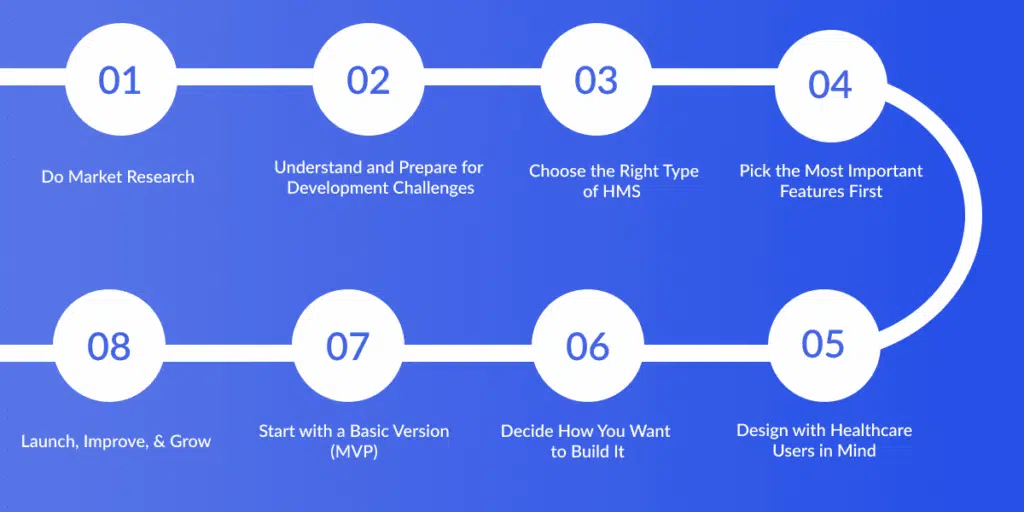
Step 1: Do Market Research
Before starting to build a hospital management system, it’s important to do thorough market research. This means understanding the common problems hospitals face in their daily operations. You should also look at what features users want but don’t get from the software they currently use. Check out other hospital software in the market to see what they offer, and try to figure out how your system can be different or better.
Step 2: Understand and Prepare for Development Challenges
Developing hospital management software comes with some specific challenges. First, you must make sure patient data is handled securely to meet HIPAA regulations. Second, your system should be able to connect and work with other healthcare systems, which can be tricky. The software should also be easy to use, especially for doctors and nurses who are always busy. Partnering with an experienced software development company can help you deal with these issues effectively.
Step 3: Choose the Right Type of HMS
There are different types of hospital management systems, and you need to choose the one that best fits your hospital’s needs. Some systems focus on administrative tasks like scheduling and managing patient records. Others are more operational and help with real-time medical data and coordination between departments. Financial systems deal with billing and insurance, while subject-based systems convert old paper records into digital formats like EHR or EMR.
Step 4: Pick the Most Important Features First
It’s better to start with the most important features. These can include patient registration, managing appointments, access to electronic medical records, integration with labs and pharmacies, billing, insurance, and generating reports. Starting small helps you build a flexible system that can grow and improve over time.
Step 5: Design with Healthcare Users in Mind
The design of your software is very important. It should be simple and easy to use so that medical staff can focus on their work without distractions. Since doctors and nurses often use tablets or mobile devices, the system should work well on smaller screens too.
Step 6: Decide How You Want to Build It
You have two main options for developing your hospital management software. One is to go for custom development, where a team builds the software exactly the way you want it. This takes more time but gives you more flexibility.
The other option is to use ready-made software (also called SaaS), which is faster to launch but may not meet all your needs. For a long-term solution that can grow with your hospital, it’s usually better to go with custom development.
Step 7: Start with a Basic Version (MVP)
Before building the full system, it’s smart to first create a Minimum Viable Product (MVP). This is a basic version of the software with only the most essential features. You can launch it quickly, usually within 4 to 6 months and use feedback from real users to improve it. This saves both time and money and ensures you’re building something people actually need.
Step 8: Launch, Improve, and Grow
Once your MVP is working well, you can start adding more advanced features like radiology, HR management, or analytics. Keep testing your system to make sure it works smoothly, keeps data safe, and is easy to use. By constantly improving the software, you make sure it stays useful and grows along with your hospital.
How Much Does a Hospital Management System Cost?
The cost to develop hospital management software depends on several factors:
| Factors | Estimated Cost Range |
|---|---|
| MVP Development | $20,000 – $30,000 |
| Mid-size Custom HMS | $30,000 – $40,000 |
| Full-scale Enterprise HMS | $50,000+ |
| Maintenance & Support | 15-20% of development cost/year |
Key Cost Factors:
- Number of modules and features.
- Design complexity and scalability.
- Integration with third-party systems.
- Compliance (e.g., HIPAA, GDPR).
- Development region (US developers cost more than offshore teams).
Partnering with a reliable software development company helps manage both the cost and quality of the solution.
What are the Different Types of Hospital Management Systems?
When you want to develop hospital management software, it’s important to know the different types of systems. Each type helps in different ways, depending on the hospital’s needs. Let’s explore them one by one:
1. On-Premises Hospital Management System
This type of system is installed directly in the hospital. It runs on the hospital’s own computers and servers.
- Good for: Hospitals that want full control of their data and software.
- Needs: Increases the app's accessibility by providing multiple languages to a wide range of users.
- Cost: High, because of installation and upkeep.
2. Cloud-Based Hospital Management System
This system runs on the internet. You don’t need to buy hardware. You just log in and start working.
- Good for: Hospitals that want flexibility and lower maintenance costs.
- Needs: A stable internet connection and good data security.
- Cost: Usually lower than on-premises systems.
3. Open-Source Hospital Management System
In this type, the source code is open and free to use. You can customize the software the way you want.
- Good for: Hospitals with a tech team that can build or edit the software.
- Needs: Developers to handle setup and updates.
- Cost: Low to medium, depends on customization.
4. Integrated Hospital Management System
This system combines many parts like patient records, billing, pharmacy, and appointments in one place.
- Good for: Large hospitals or clinics that want everything in one system.
- Needs: A well-structured software with strong support.
- Cost: Higher, but saves time and boosts work efficiency.
5. Other Types of HMS
- Mobile HMS: Apps that help hospital staff use the system from mobile phones.
- Web-Based HMS: Access the system from any device using a web browser.
- Specialized HMS: Custom software made for certain departments like dental, eye care, etc.
- Enterprise HMS: Large systems made for chains of hospitals or big healthcare groups.
- Patient Engagement HMS: Focuses on helping patients track their health, schedule appointments, and get reminders.
The Future of Hospital Management: Trends
The world of hospital management is changing fast. New technology is making hospitals smarter and more efficient. If you want to build hospital management software today, make sure it’s ready for tomorrow too!
Here are some exciting trends:
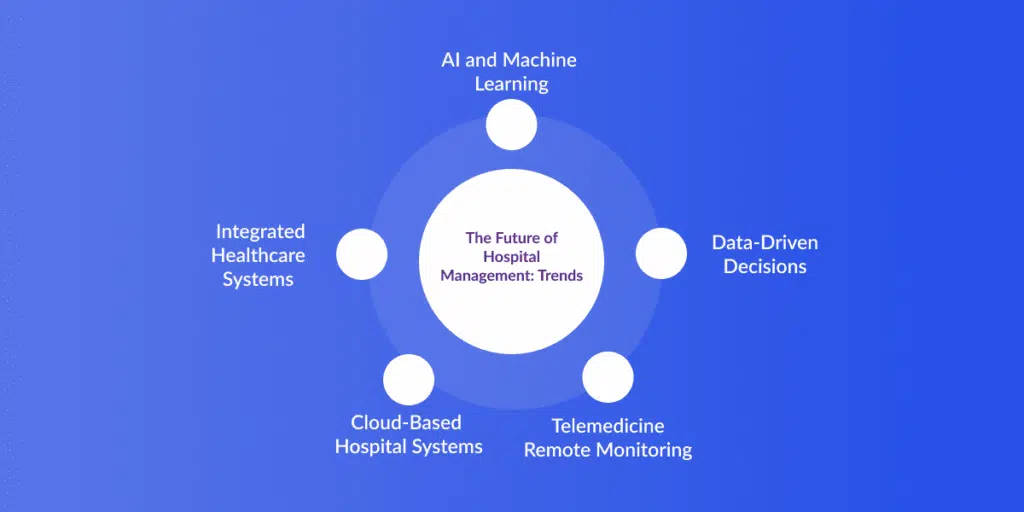
1. AI and Machine Learning
Artificial Intelligence (AI) and Machine Learning (ML) help in:
- Predicting health problems early
- Creating personal care plans for each patient
- Improving decisions by doctors and hospital staff
With these tools, you can offer better care and reduce costs. Many modern hospitals are already using AI in remote patient monitoring software development to track health in real time.
2. Data-Driven Decisions
Hospitals collect a lot of data every day. Smart software can use that data to:
- Find problems in operations
- Track patient recovery
- Make better financial and staffing plans
If you build hospital management software that understands data, your hospital can work smarter, not harder.
3. Telemedicine and Remote Monitoring
Not every patient can visit the hospital. Some need care from home. That’s where telemedicine helps.
- Doctors can talk to patients through video calls.
- Nurses can monitor patients with smart devices.
- Patients stay safe, and hospitals save time.
Adding telemedicine features when you develop hospital management software makes it more useful and future-ready.
4. Cloud-Based Hospital Systems
Cloud systems are popular. But in the future, they will become standard.
- Easy to update and manage
- Save money on IT infrastructure
- Helps teams work together from different locations
If you’re planning to build hospital management software, cloud should be on top of your checklist.
5. Integrated Healthcare Systems
All health systems, labs, pharmacies, clinics, and hospitals will talk to each other.
- No need to repeat patient history everywhere
- Better communication between doctors
- Patients get quicker and more accurate care
To stay ahead, make sure your software supports integration. A software development company can help you design an all-in-one platform.
Conclusion
To develop hospital management software, you need the right plan, tools, and team. Whether you want a small system for a clinic or a big solution for a hospital, the software must be fast, secure, and easy to use.
You also need to choose the right cloud-based, integrated, mobile, or open-source, based on your budget and goals.
Keep in mind the latest trends like AI, remote care, and cloud systems. These are not just tools; they help you serve patients better and run your hospital smoothly.
To save time and avoid errors, partner with a reliable software development company that understands your needs. The cost to develop hospital management software may vary, but with the right features, it’s always worth the investment.
FAQs
Q1. How much does it cost to develop hospital management software?
A: The cost to develop hospital management software depends on many things: features, type (cloud or on-premise), number of users, and more. A basic version may cost between $10,000 to $50,000. A full-featured system can cost more.
Q2. How long does it take to build hospital management software?
A: It can take 3 to 9 months or more, depending on the complexity. A simple system takes less time; a large one with AI or telemedicine features takes longer.
Q3. What features should I include in my HMS?
A: Some must-have features are:
- Patient records
- Appointment scheduling
- Billing and payments
- Pharmacy management
- Reports and analytics
- Telemedicine (optional)
- AI-based alerts (optional)
Q4. Can I add telemedicine later?
A: Yes! If you plan smartly during development, you can add new features like telemedicine or AI later.
Q5. Should I choose cloud-based or on-premises HMS?
A: Cloud-based is better if you want low cost, easy updates, and remote access. On-premises is good if you want full control and have a strong IT team.

RM Mishra
Co-Founder
Developer Bazaar technologies
